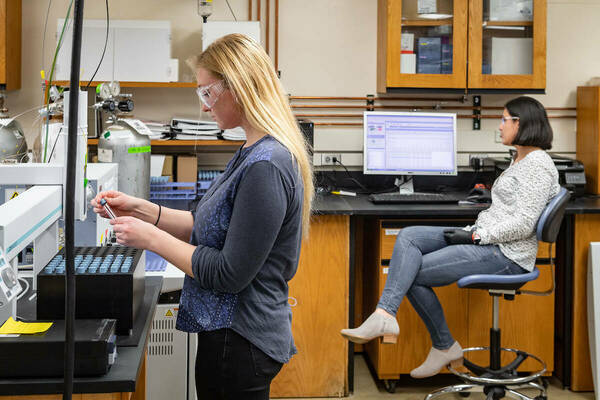
 Graduate students conduct research at the Center for Environmental Science and Technology
Graduate students conduct research at the Center for Environmental Science and Technology
Nine students from the University of Notre Dame have received Center for Environmental Science and Technology (CEST) Predoctoral Research Fellowships. The CEST program provides students with a semester-long fellowship in any area of environmental science or engineering.
“Each year CEST is grateful to support student research that spans a number of environmental-related topics and that also utilize our center’s equipment,” said Jeremy Fein, professor of civil & environmental engineering & earth sciences (CEEES) and director of CEST. “I look forward to seeing the results of the research this program supports and the educational progress these students make during their fellowship-funded semester.”
The 2019 CEST Predoctoral Research Fellows are:
- Katherine Barrett, doctoral student in biological sciences, to research microbalites, a seasonal food source for brine shrimp in Utah’s Great Salt Lake, with advisor Gary Belovsky, Gillen Director of the University of Notre Dame Environmental Research Center and professor of biological sciences.
- Margaret Butzen, doctoral student in CEEES, to study bacterial absorption of per- and poly-fluoroalkyl substances in the Fein lab.
- Hunter Ford, doctoral student in chemical and biomolecular engineering, to research lonomer coatings for mitigating the polysulfide shuttle effect in metal-sulfur batteries with advisor Jennifer Schaefer, assistant professor of chemical and biomolecular engineering.
- John Hoffman, doctoral student chemical and biomolecular engineering, to study controlled functionalization of nano-filtration membranes with advisor William Phillip, associate professor of chemical and biomolecular engineering.
- Junyeol Kim, doctoral student in CEEES, to research stream transport behavior of nanoparticles in realistic stream conditions with advisor Kyle Doudrick, assistant professor of CEEES.
- Keith O’Connor, doctoral student in CEEES, to study climatic controls on modern vegetation and microbial communities with advisor Melissa Berke, Clare Boothe Luce Assistant Professor of CEEES.
- Carly Olsen, doctoral student in biological sciences, to research estimates of carbon, nitrogen, and phosphorus fate and transport in inland lakes with advisor Stuart Jones, associate professor of biological sciences.
- Rebecca Scheidt, doctoral student in chemistry and biochemistry, to study the creation of mixed cation perovskites for clean energy with minimal environmental impact with advisor Prashant Kamat, Rev. John A. Zahm Professor of Science.
- Matt Trentman, doctoral student in biological sciences, to research the alleviation of the negative impact of nutrient loading to streams and rivers with advisor Jennifer Tank, Galla Professor of Biological Sciences and director of the Notre Dame Environmental Change Initiative.
The competition for the CEST Predoctoral Research Fellowship program is typically announced and awarded during the Spring semester. To learn more about fellowship eligibility and application review criteria, please visit https://cest.nd.edu/fellowships/.
The Center for Environmental Science and Technology fosters interdisciplinary environmental research and education by providing cutting-edge analytical technologies needed to address national and international problems. CEST supports interdisciplinary environmental education, research, and stewardship through a variety of education and outreach activities. To learn more about the center, please visit https://cest.nd.edu/.
Contact:
Brandi Klingerman / Research Communications Specialist
Notre Dame Research / University of Notre Dame
bklinger@nd.edu / 574.631.8183
research.nd.edu / @UNDResearch
About Notre Dame Research:
The University of Notre Dame is a private research and teaching university inspired by its Catholic mission. Located in South Bend, Indiana, its researchers are advancing human understanding through research, scholarship, education, and creative endeavor in order to be a repository for knowledge and a powerful means for doing good in the world. For more information, please see research.nd.edu or @UNDResearch.
Originally published by at cest.nd.edu on June 03, 2019.